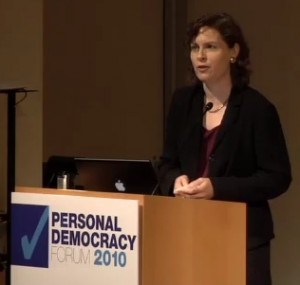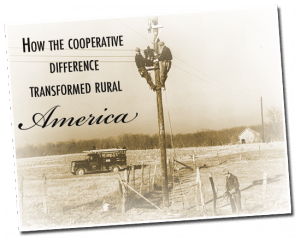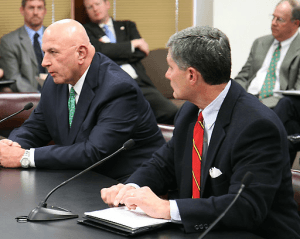
Diana Thibodoux documents Comcast's shoddy work in her rented home.
The city of Savannah, Georgia is at the mercy of Comcast Cable, and city officials and local residents are fed up with high bills, the “don’t care” attitude from customer service, and cable and broadband that fails repeatedly, sometimes extending for weeks.
The fervor came to a head in December when city council had accumulated more than 150 complaints from local residents, deciding public hearings were warranted to deal with the city’s dominant cable company, Comcast.
“Comcast Destroyed My House”
Diana Thibodoux called Comcast to deal with a cable issue in her Ardsley Park home and never expected the service call would turn into an expensive nightmare.
Thibodoux says the Comcast technician who showed up decided on his own to rewire the house for cable and began drilling through brick and expensive plaster, stringing easily visible black coaxial cable along outside walls, inside baseboards and up over doors, all in plain sight.
“My house looks like a frat house,” Thibodoux complained to Comcast officials who were on hand to listen to customer complaints at the first of four public “town hall” meetings.
“I’ve never dealt with a company so incompetent,” another local resident said.
[flv width=”640″ height=”500″]http://www.phillipdampier.com/video/WTOC Savannah Ive never dealt with a company so incompetent 2-6-12.mp4[/flv]
WTOC in Savannah shares the horror story of Diana Thibodoux, who says Comcast destroyed her house thanks to an overzealous, incompetent repairman. (3 minutes)
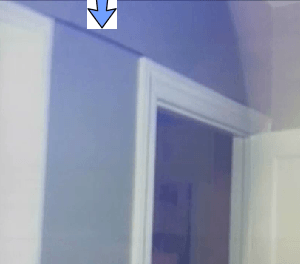
At least everyone knows she has cable.
Residents used the public sessions to vent about long hold times which can extend to as much as two hours, poor quality service, and what city officials call the predictable outcome of a company that has “a stranglehold” over Savannah’s cable TV market.
“Comcast has treated Savannah like a third world country for years, delivering the best service to the wealthiest neighborhoods while leaving cable lines dangling on the ground in the areas they don’t care about,” said Stop the Cap! reader Jenny Child, who has kept a folder of papers documenting more than a dozen service calls regarding poor Internet service at her small business.
“If it rains in Savannah, and it does so a lot, our Internet goes out,” Child complains. “We have called and called but the technician shows up when it is bright and sunny and shrugs his shoulders and says there is no problem.”
Child and her two employees now handle their online business activities based on local weather forecasts.
“If the man says we’re getting rain today, we handle our Internet things real quick, because as sure as I’ll be in church on Sunday, we won’t have service after the first drops fall from the sky,” she says.
 Child keeps calling Comcast when her Internet service drops out, but long hold times to reach the company’s outsourced-to-India customer service department have cut into her business.
Child keeps calling Comcast when her Internet service drops out, but long hold times to reach the company’s outsourced-to-India customer service department have cut into her business.
“I can’t be sitting here on hold with Comcast for 45 minutes waiting for some representative’s nails to dry so she can pick up the phone and deal with customers,” Child complains. “It’s the biggest cable company ever, and don’t they own NBC? How many people do they have working there that they can’t answer the phone. Maybe everyone else is calling to complain too.”
Comcast’s Business Broadband Blockade Prompts Whining When Potential Competition Shows Up

Hargray is wiring downtown Savannah with fiber broadband to serve long-neglected area businesses
While fielding complaints from more than 50 local residents at a second meeting held to address complaints, Comcast executives questioned whether the city of Savannah was giving favorable treatment to Hargray, a new entrant pushing to bring 21st century broadband into the city of Savannah for businesses Comcast has refused to serve for years.
Comcast complained they didn’t mind competition, but wanted “a level playing field,” a statement that prompted an immediate and angry response from some members of the city council, who blasted the cable company for its attitude.
Aldermen Tony Thomas, John Hall, and Tom Bordeaux all noted Comcast has steadfastly refused to wire many downtown business buildings for cable broadband service, despite years of requests. Comcast claimed the relatively low number of customers did not justify the cost to expand the service.

Alderman Tony Thomas has championed the ongoing dispute with Comcast Cable on behalf of local residents.
All three could not understand why Comcast had a sudden urgency to complain about unfair treatment when a competitor sought to provide the service they never did.
“If [Comcast] did not want to offer that service previously and someone else is coming in to provide the service, where is the sticking point?” Thomas said.
Bordeaux was more blunt in his remarks intended for Comcast.
“Tell them to sue us,” he said.
In contrast to service from AT&T and Comcast, which often markets 3-6Mbps broadband in Savannah, Hargray’s fiber broadband project will deliver speeds up to 1Gbps, first to business customers. But the company promises it is considering selling to residential customers as well.
Great Deals, But Only for “Selected Neighborhoods”
As Comcast’s bad press has become fodder for the nightly newscasts on several of the city’s television outlets, Comcast literally took to the streets to try and mitigate their public relations nightmare. In the process, they created a new one.
Councilman Tony Thomas is happy Comcast is approaching upset customers and offering them substantial discounts on their cable bill. But he’s not happy Comcast is only extending those deals to certain customers, not all.
Thomas wants the deals offered to everyone, something that he says is not happening today.
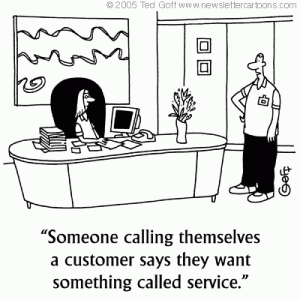
(Courtesy: Ted Goff/newslettercartoons.com)
Andy Macke, Comcast’s Vice President of Communications counters, “All they have to do is call 1-800-COMCAST and they will hear the same deals that the same people are getting from those reps going from door to door.”
“Comcast’s attitude in Savannah is see no evil, hear no evil,” says Jeff White, a Comcast customer who has watched the scuffle. “They don’t even admit there is a problem until it runs on the evening news and city council waves 150 complaints they are getting at the camera — the ones Comcast ignored.”
Macke himself told WJCL-TV, which has covered the dispute with Comcast repeatedly, he was “unaware of the extent of the concerns that our Savannah customers had with us.”
Despite promises to make things right, Alderman Thomas says many complaints are still unresolved.
“We were told that all of those folks had been contacted and that their problems were being worked on. I have since found a few of these people [who] have had no contact whatsoever with Comcast,” Thomas told the TV station.
“Under no circumstances should City Council let the situation with Comcast get pushed under the rug,” one person wrote in the Vox Populi column in the Savannah Morning News. “We the people need help!”
No Help On the Way
Unfortunately for that reader, and other Savannah residents, an attempt by Savannah city officials to attract competing cable service has met with no success and no interest. Cable operators almost never compete head to head, each respecting the service areas of fellow providers. Hargray’s interest in Savannah is primarily serving business customers, and the option for municipal service may not be possible much longer if a bill supported by Comcast, SB 313, ever becomes law.
[flv width=”640″ height=”500″]http://www.phillipdampier.com/video/Comcast in Savannah 2-8-12.flv[/flv]
A compilation of news reports from WJCL, WSAV, and WTOC exploring Comcast’s performance problems in the city of Savannah, Georgia. (15 minutes)



 Subscribe
Subscribe

